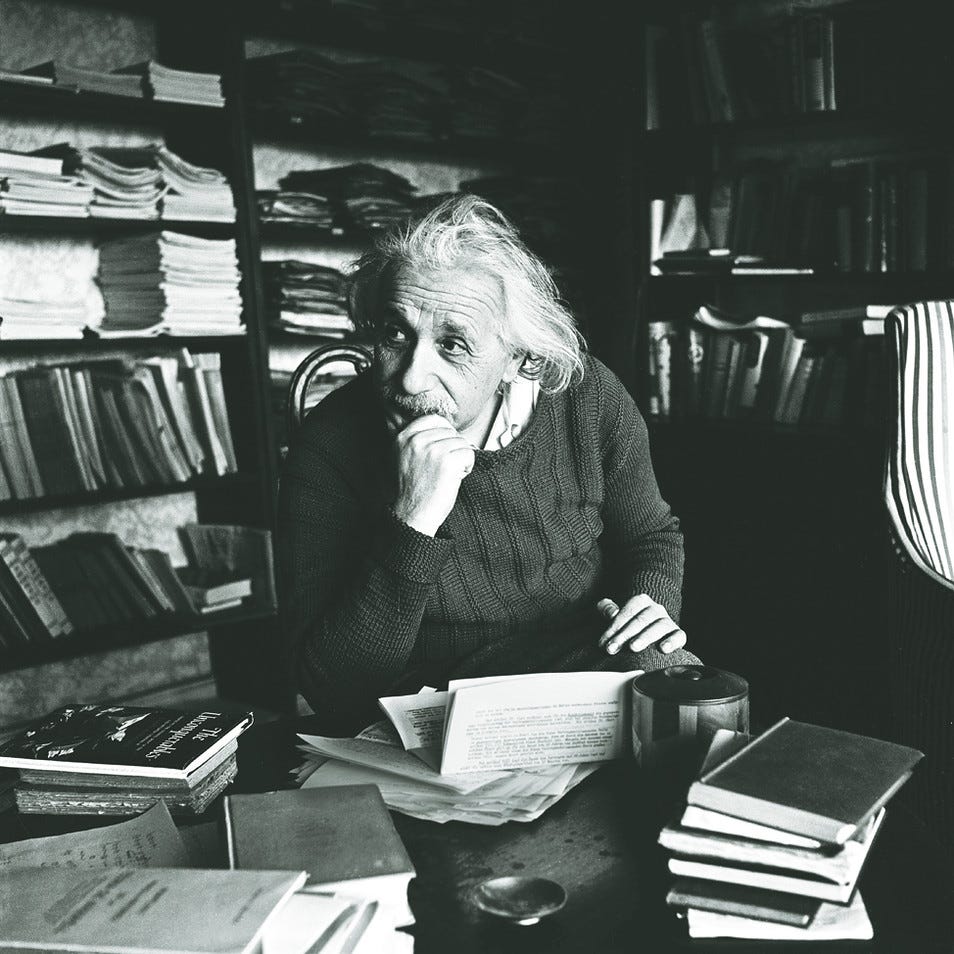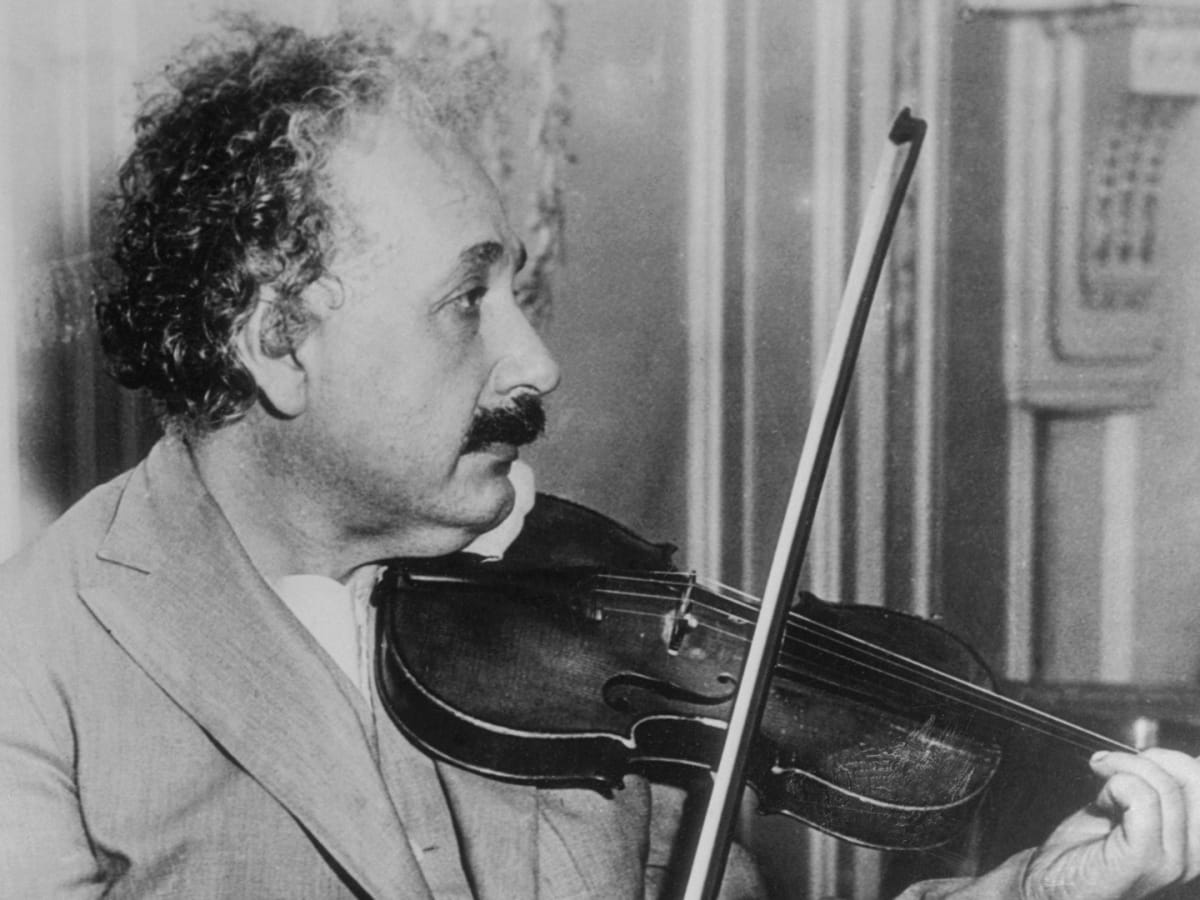Why Did Einstein Remove his Hat in Rainy Weather?
And other unique thoughts by Einstein about politics, death and authority
There are many wise quotes and eccentric behaviors attributed to Albert Einstein. He was certainly very rational and algorithmic in his thinking and behavior. He also had a less-than-ideal resume’ as an emotionally-available father and a husband. Here are a few instances of how he lived and thought about issues like death, politics and authorities, which I find interesting and decided to share with you.
His Logical Way to Evaluate Problems
He approached all problems algorithmically with his own decision tree and criteria. His decision tree, however, sometimes ignored risks and rewards to himself (as an organism). Here is an example:
His son Peter Bucky happily spent time driving Einstein around, and he later wrote down some of his recollections in extensive notebooks. They provide a delightful picture of the mildly eccentric but deeply un-affected Einstein in his later years. Peter tells, for example, of driving in his convertible with Einstein when it suddenly started to rain. Einstein pulled off his hat and put it under his coat. When Peter looked quizzical, Einstein explained: “You see, my hair has withstood water many times before, but I don’t know how many times my hat can.
Quoted by Walter Isaacson, author of “Einstein: His Life and Universe”
He did not think like Homo economicus
In my books (upcoming), I refer to the new breed of humans as Homo economicus, with brains wired to optimize the opportunity cost of our time and constantly finding ways to increase it following a scalable (exponential) growth pattern. I believe Einstein was not Homo economicus and not always thinking about growing his income or the (monetary) value of his time. Here is an example:
Einstein had been among the first to be invited to the Institute for Advanced Study in Princeton, New Jersey, and offered carte blanche as to salary. To the director’s dismay, Einstein asked for an impossible sum: It was far too small! The director had to plead with him to accept a larger salary.
Recalled by mathematician and physicist Professor Banesh Hoffmann
Instead of Pretending to be Smart, He Took the Time to Understand a Problem
I believe a sign of any good problem-solver, real scientist or wise person is to be a humble and patient listener and reader. Problems are complex. Listening and reading to understand a problem takes time. Homo economicus don’t have too much free (unpaid) time and constantly face deadlines. I believe Einstein was not Homo economicus. For example, when asked what equipment he might need in his office he replied “A desk or table, a chair, paper and pencils.. Oh yes, and a large wastebasket, so I can throw away all my mistakes.”
Here is an example of how Einstein really cared about spending the time to understand someone explaining a new idea as opposed to trying to rush them or sound/look smart:
As I began to explain my ideas, he asked me to write the equations on the blackboard so that he could see how they developed. Then came the staggering—and altogether endearing—request: “Please go slowly. I do not understand things quickly.” This from Einstein! He said it gently, and I laughed. From then on, all vestiges of fear were gone…Dressed in illfitting clothes, his hair characteristically awry, he smiled a warm welcome. His utter naturalness at once set me at ease
Recalled by Professor Banesh Hoffmann
He was not Appreciated by the Establishment and Academic Authorities
Einstein failed his first entrance examinations at the Swiss Federal Polytechnic School in Zurich, but was admitted a year later. He was also rejected by universities when he applied for academic positions. So he ultimately found work, in 1902, as a patent examiner in Berne.
He had a general contempt for authorities. He once said: “To punish me for my contempt of authority, Fate has made me an authority myself.”
The Russell–Einstein Manifesto was issued in London on 9 July 1955 by Bertrand Russell in the midst of the Cold War. It highlighted the dangers posed by nuclear weapons and called for world leaders to seek peaceful resolutions to international conflict. The signatories included eleven pre-eminent intellectuals and scientists, including Albert Einstein, who signed it just days before his death on 18 April 1955.
Some of His Meaningful Words and Views About Politics and Death
About believing mass media and authorities: “You have to remain critically vigilant. Question every premise, challenge conventional wisdom, and never accept the truth of something merely because everyone else views it as obvious. Resist being credulous!”
About courage by older wiser people: “I believe that older people who have scarcely anything to lose ought to be willing to speak out in behalf of those who are young and are subject to much greater restraint.”
About why humans and especially bureaucrats and authoritative scientific figures seem unable to solve many recurring problems: “We cannot solve our problems with the same thinking and mindset we used when we created them.”
About loyalty and conformity to a political party: “How an intelligent man can subscribe to a party I find a complete mystery!” He also said: “Physicists are not used to trimming or compromising their equations in order to get them accepted. Which is why they do not make good politicians.”
About justice: “Striving for social justice is the most valuable thing to do in life.”
About death of a loved one: “He has departed from this strange world a little ahead of me. That means nothing. For us believing physicists, the distinction between past, present and future is only a stubborn illusion.”



